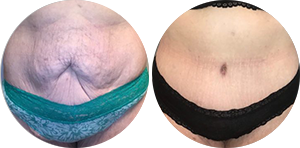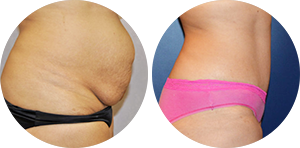Instructions for Lip Lift
Offered at our convenient location in Raleigh, NC

Post Operative Instructions for Lip Lift
- After surgery elevate your head and shoulders at a 30° to 45° angle on two or more pillows. When awake in bed please flex your ankles and legs up and down 4-6 times every hour. This will help lower extremity circulation and minimize the risks of swelling and blood clots.
- After surgery, avoid straining of any kind for the first 2 days. Facial movements (smiling, talking, chewing, yawning, etc.) should be kept to a minimum for the first week. Avoid turning your head to either side as this will pull on the stitch lines. To turn, move your head and shoulders as a unit.
- Apply towel wrapped ice bags or cooling packs (keep them cold, but not frozen) to the exposed areas of your face for the first 72 hours to reduce post-operative swelling.
- If you have pain or discomfort, take the pain medication every 4-6 hours. It is best to take the pain medication with crackers, Jell-O, etc. If you do not have pain please do not take the pain medication. Do not drink alcohol while you are taking pain medication. In addition, you may be given an anti-anxiety/ muscle relaxant medication that you may take as well to prevent aggravation of the pain cycle.
- A light diet is best following surgery that day. Begin by taking liquid slowly and progress to soups or Jell-O. You may start with a soft, regular diet the next day. Over the next 6 weeks, a high protein diet will benefit your recovery. Daily protein supplementation with pre-made shakes (eg. Boost, Muscle Milk) or soluble powder (whey, soy etc.) from a nutrition store is recommended.
- Any visible sutures used are removed in 5 to 10 days. If any portion of the incision is internal (along the gum line), then the sutures placed will dissolve on their own in a similar period of time.
- Swelling of the face and neck after surgery is normal and expected. If you develop an acute onset of swelling on one side of your face or neck, which is definitely more pronounced than on the other side, or if you are having pain, which is NOT relieved by the pain medication, please call Dr. Allen or the office immediately.
- After the first 24 hours, you may start cleaning along any external incision line under the nose with a mild soap (Neutrogena, Ivory, etc.) and use a moisturizer on your face, being careful to keep it away from the stitch lines. Apply a thin layer of polysporin (Neosporin type) ointment to these areas after cleaning twice daily for two days.
- Avoid eating any hard/firm foods (ex: apples, carrots) or taking exaggerated (large) bites of food for the first two weeks. Chew all food slowly and thoroughly.
- DO NOT SMOKE or ingest any nicotine containing products. This is very important for optimal wound healing.
- You may gradually resume basic daily activities after 2 days being careful to avoid any activity that causes pain or discomfort. Lifting of objects heavier than 10 pounds should be avoided for 3 weeks. Strenuous activities and exercises are to be avoided until 4 weeks after surgery. During the recovery period your heart rate should stay below 100 beats per minute.
- Cosmetics can be worn on the face as early as 10 days after surgery. There may be a feeling of numbness of the chin and jawline that will subside.
- All incisions and the skin of your face will be extremely sensitive to sunlight during the healing phase. Protect your facial skin from excessive exposure to the sun for 8 weeks. Direct sun contact or tanning booths are to be avoided. Wearing a wide brim hat and use of a clinical grade sunscreen with a SPF of at least 30 with zinc oxide (UVA and UVB protection) is recommended.
- Silicone scar creams can usually be started at about 4 weeks following surgery.
What To Expect After Surgery
- Sensations like numbness, sharpness, and burning are common during the healing process. These sensations may last several weeks and will gradually disappear. The upper lip sometimes will feel numb and occasionally the front teeth will feel “funny” due to the areas of numbness. These feelings will gradually disappear.
- Bruising and swelling are normal for 5-7 days. It will disappear over time. The area around your mouth will feel tight but not necessarily look tight (it will look natural). This is normal and will disappear over time as the swelling and numbness resolves.
- Pain and Itching may occur at the surgical site. Also soreness , tightness, pressure or mild to moderate pain may also occur.
Medications
• Antibiotic: Start your antibiotic tablet the night of surgery and take all tablets as prescribed and until finished.
• Pain: You will be prescribed a pain medication for post-operative pain control. If your discomfort after surgery is not strong you are welcomed to take Tylenol in place of the prescribed medication. Do not take Tylenol with the pain medication, often the medication you are prescribed will have Tylenol in it. Do not exceed 4,000 mg of Tylenol in any 24-hour period. Take medication with food to minimize risk of nausea.
• Nausea: A common side effect after general anesthesia and strong medications. If you are experiencing nausea, we advise that you take your nausea medication.
• Constipation: You will experience constipation if taking narcotic pain relievers. MiraLAX, Colace or Peri-Colace, or other over the counter laxatives are recommended. Do not wait to take until you are constipated. Begin treatment with narcotic use.
• Medications to Avoid: Take only those medications approved or prescribed by your surgeon. Avoid medications containing aspirin or ibuprofen (Advil, Motrin, Naproxen, others) for two weeks before and after surgery. These medications may increase bleeding.
• Substances to Avoid: Avoid alcohol, nicotine, and caffeine, for these will dramatically slow the healing process.
Please note: – If you have nausea, vomiting, rash, shortness of breath, constipation or diarrhea after taking your medications, please call our office.
If you develop a fever (oral temperature greater than 101°), redness and/or increased pain at the surgical incision sites, please call Dr Allen or the office.
If you have any other questions, please contact the office. There is no such thing as a minor question or concern. If you need immediate care, someone will be available for you at all times. During working hours, please contact the office at 919 676 5052.


